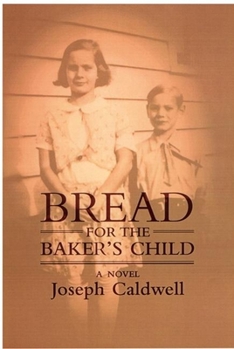Bread for the Baker's Child
Select Format
Select Condition 
Book Overview
After a ten-year silence, Joseph Caldwell returns with a rich novel of immense and resonant scope. This description may be from another edition of this product.
Format:Paperback
Language:English
ISBN:1889330663
ISBN13:9781889330662
Release Date:January 2002
Publisher:Sarabande Books
Length:284 Pages
Weight:0.75 lbs.
Dimensions:0.6" x 6.0" x 8.9"
Customer Reviews
2 ratings
Bread for the Baker's Child: A Novel
Published by Thriftbooks.com User , 15 years ago
Bread for the Baker's Child is a compelling and haunting book... I purchased several copies of this book to give as gifts to friends (which included his most recent novel titled The Pig Did It), one of whom emailed me recently to say that from the very first page, he was under "the charm, the spell..." and thus wanted to know where I had found such treasures (I also gave him a copy of The Pig Did It)! Mr. Caldwell is truly an extraordinary writer. His writing is exquisite and his story telling power is nothing short of amazing. Thus, I recommend his books highly. In fact, my friend also said that he intends on getting his other books as well. Yolaine Brooklyn, NY
Intense and Thought Provoking
Published by Thriftbooks.com User , 22 years ago
When informed of his sister Aggie's emotional collapse following a tragic fire that had caused the demise of thirty eighth-graders at the school where she was Sister Superior, Phillip 'Peppy' Manrahan was faced with a Heinz dilemma. Aggie, a nun who went by the religious name of Sister Mary Rachel, needed electroconvulsive shock therapy in order to cure her of screaming fits and grief-induced psychosis. Because Phillip held a long-simmering rage and resentment over the lack of respect that his corporation's superiors had shown him, he decided to use his expertise as an accountant to embezzle company funds to pay for Aggie's treatment. His thievery didn't stop there. He continued to cook the company books as a way to endow the Order of the Sisters of the Annunciation with funds for a new wing of the college library and much-needed repairs for their schools, convents, and Motherhouse - more than one million dollars in all. The Order had graciously accepted these donations from their anonymous benefactor, not knowing that he was a thief and Sister Rachel's younger brother. Later, when Phillip heard about the cancellation of an office colleague's health insurance because he had AIDS, Phillip's rage at the company resurfaced, and he resorted to embezzlement again to help Jack. After Jack's death, Phillip was caught for stealing the twenty-three thousand dollars that he had given Jack and was sentenced to prison for four years. There, Phillip, a handsome gay man in his fifties, became the protector of another inmate, Talford Starbuck, a younger man with a hideous disfigurement. At first, their hooking up was only a sham, designed to protect the fragile Starbuck from other inmates. As time went by, they fell in love. Then, a terrible chain of events caused several deaths and brought about Phillip's condemnation to death row, sentenced to die in the electric chair. At the same time that Phillip was doing his prison time, Sister Rachel was tending to her dying Mother General in an old mansion in an unnamed location. After Mother's death, the remaining half-dozen sisters in this moribund Order would be scattered to new assignments, and the Motherhouse would be bulldozed. In alternating passages, the reader is swept along from prison to convent and back again, with intricate flashbacks and recalled memories that serve to provide insights and clues to the characters' motivations and situations. The narrative structure resembles a fugue, with themes stated and restated, then varied, then counterpointed. One overarching theme in the novel is taken from Scripture, from Saint Paul's first letter to the Corinthians, where he exhorts them to abide by what was known later as the Enchiridion and reminds them of what the Church would later call the theological virtues of faith, hope, and love (or charity, depending on the translation). 'If I have not charity' is the responsorial thread that is woven through the narrative. A second overarching theme is the 'Magnificat




